Women's Health & Nutrition: Maternal Diets Impact on Child Survival
VerifiedAdded on 2023/06/04
|11
|2610
|61
Essay
AI Summary
This essay delves into the crucial role of maternal diets during pregnancy and their significant impact on both the mother's health and the survival and well-being of the child. It highlights that proper nutrition, starting from preconception and continuing through pregnancy and breastfeeding, is essential for maternal well-being and positive maternal outcomes. The essay discusses key macronutrients and micronutrients, such as proteins, fats, iron, calcium, and vitamins, and their specific roles in fetal development and maternal health. It also addresses the complications arising from inadequate or excessive dietary intake, including the risks of malnutrition, preterm delivery, and long-term health issues for the child. Furthermore, the essay emphasizes the benefits of healthy eating during pregnancy, such as reduced pregnancy complications, prevention of congenital disabilities, and healthy birth weights. The conclusion stresses the importance of maternal education and healthcare access to ensure optimal nutrition and reduce infant mortality and morbidity rates, advocating for government support in providing appropriate pregnancy education.
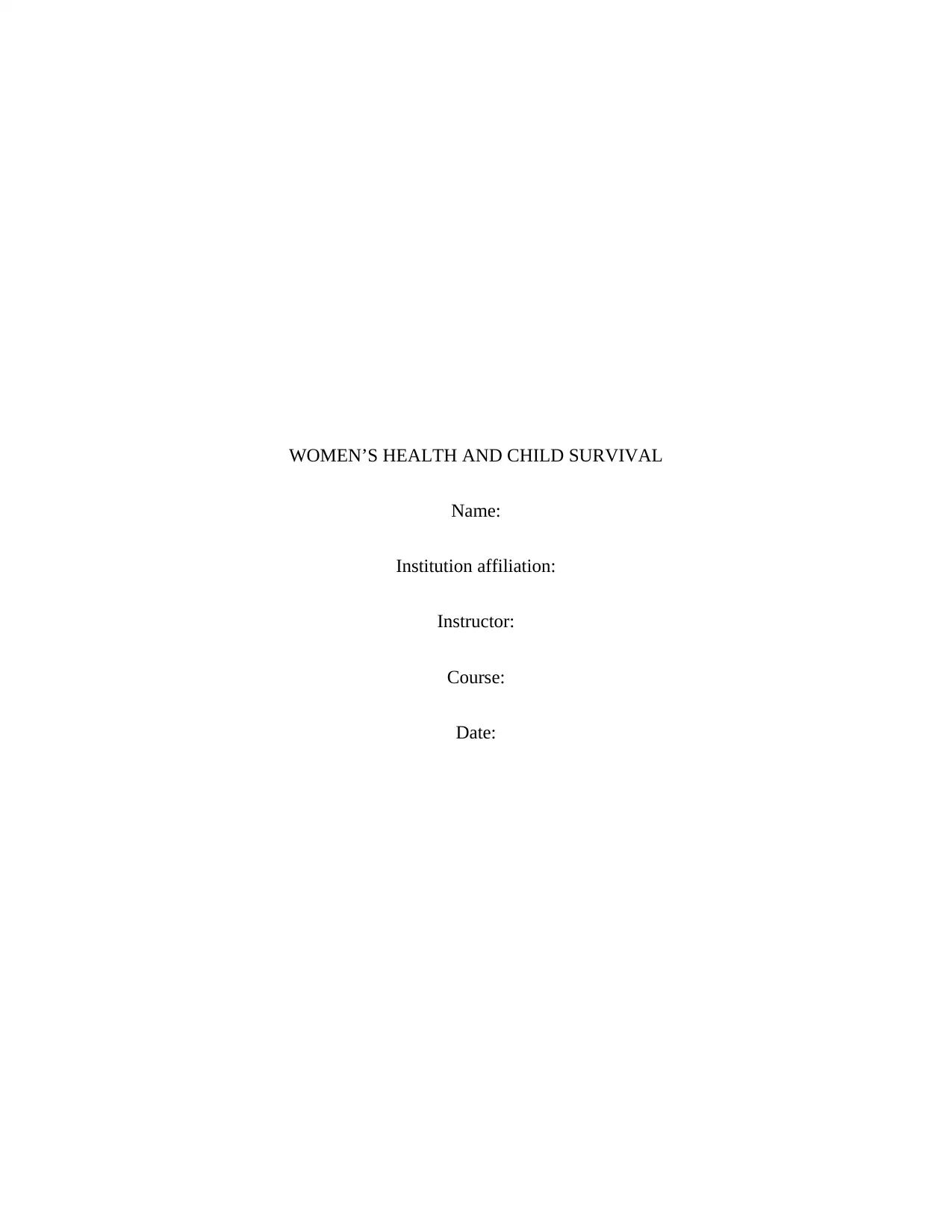
WOMEN’S HEALTH AND CHILD SURVIVAL
Name:
Institution affiliation:
Instructor:
Course:
Date:
Name:
Institution affiliation:
Instructor:
Course:
Date:
Paraphrase This Document
Need a fresh take? Get an instant paraphrase of this document with our AI Paraphraser
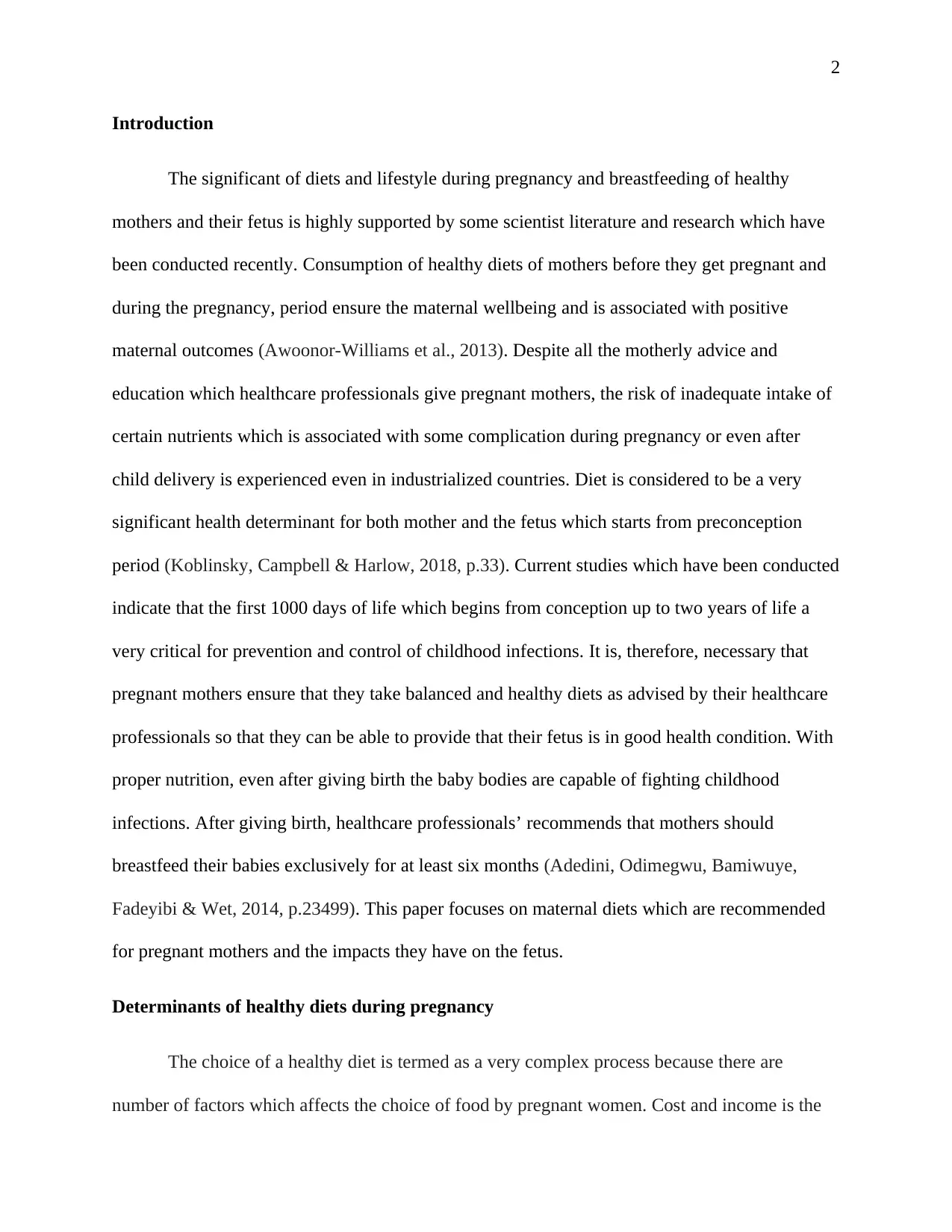
2
Introduction
The significant of diets and lifestyle during pregnancy and breastfeeding of healthy
mothers and their fetus is highly supported by some scientist literature and research which have
been conducted recently. Consumption of healthy diets of mothers before they get pregnant and
during the pregnancy, period ensure the maternal wellbeing and is associated with positive
maternal outcomes (Awoonor-Williams et al., 2013). Despite all the motherly advice and
education which healthcare professionals give pregnant mothers, the risk of inadequate intake of
certain nutrients which is associated with some complication during pregnancy or even after
child delivery is experienced even in industrialized countries. Diet is considered to be a very
significant health determinant for both mother and the fetus which starts from preconception
period (Koblinsky, Campbell & Harlow, 2018, p.33). Current studies which have been conducted
indicate that the first 1000 days of life which begins from conception up to two years of life a
very critical for prevention and control of childhood infections. It is, therefore, necessary that
pregnant mothers ensure that they take balanced and healthy diets as advised by their healthcare
professionals so that they can be able to provide that their fetus is in good health condition. With
proper nutrition, even after giving birth the baby bodies are capable of fighting childhood
infections. After giving birth, healthcare professionals’ recommends that mothers should
breastfeed their babies exclusively for at least six months (Adedini, Odimegwu, Bamiwuye,
Fadeyibi & Wet, 2014, p.23499). This paper focuses on maternal diets which are recommended
for pregnant mothers and the impacts they have on the fetus.
Determinants of healthy diets during pregnancy
The choice of a healthy diet is termed as a very complex process because there are
number of factors which affects the choice of food by pregnant women. Cost and income is the
Introduction
The significant of diets and lifestyle during pregnancy and breastfeeding of healthy
mothers and their fetus is highly supported by some scientist literature and research which have
been conducted recently. Consumption of healthy diets of mothers before they get pregnant and
during the pregnancy, period ensure the maternal wellbeing and is associated with positive
maternal outcomes (Awoonor-Williams et al., 2013). Despite all the motherly advice and
education which healthcare professionals give pregnant mothers, the risk of inadequate intake of
certain nutrients which is associated with some complication during pregnancy or even after
child delivery is experienced even in industrialized countries. Diet is considered to be a very
significant health determinant for both mother and the fetus which starts from preconception
period (Koblinsky, Campbell & Harlow, 2018, p.33). Current studies which have been conducted
indicate that the first 1000 days of life which begins from conception up to two years of life a
very critical for prevention and control of childhood infections. It is, therefore, necessary that
pregnant mothers ensure that they take balanced and healthy diets as advised by their healthcare
professionals so that they can be able to provide that their fetus is in good health condition. With
proper nutrition, even after giving birth the baby bodies are capable of fighting childhood
infections. After giving birth, healthcare professionals’ recommends that mothers should
breastfeed their babies exclusively for at least six months (Adedini, Odimegwu, Bamiwuye,
Fadeyibi & Wet, 2014, p.23499). This paper focuses on maternal diets which are recommended
for pregnant mothers and the impacts they have on the fetus.
Determinants of healthy diets during pregnancy
The choice of a healthy diet is termed as a very complex process because there are
number of factors which affects the choice of food by pregnant women. Cost and income is the
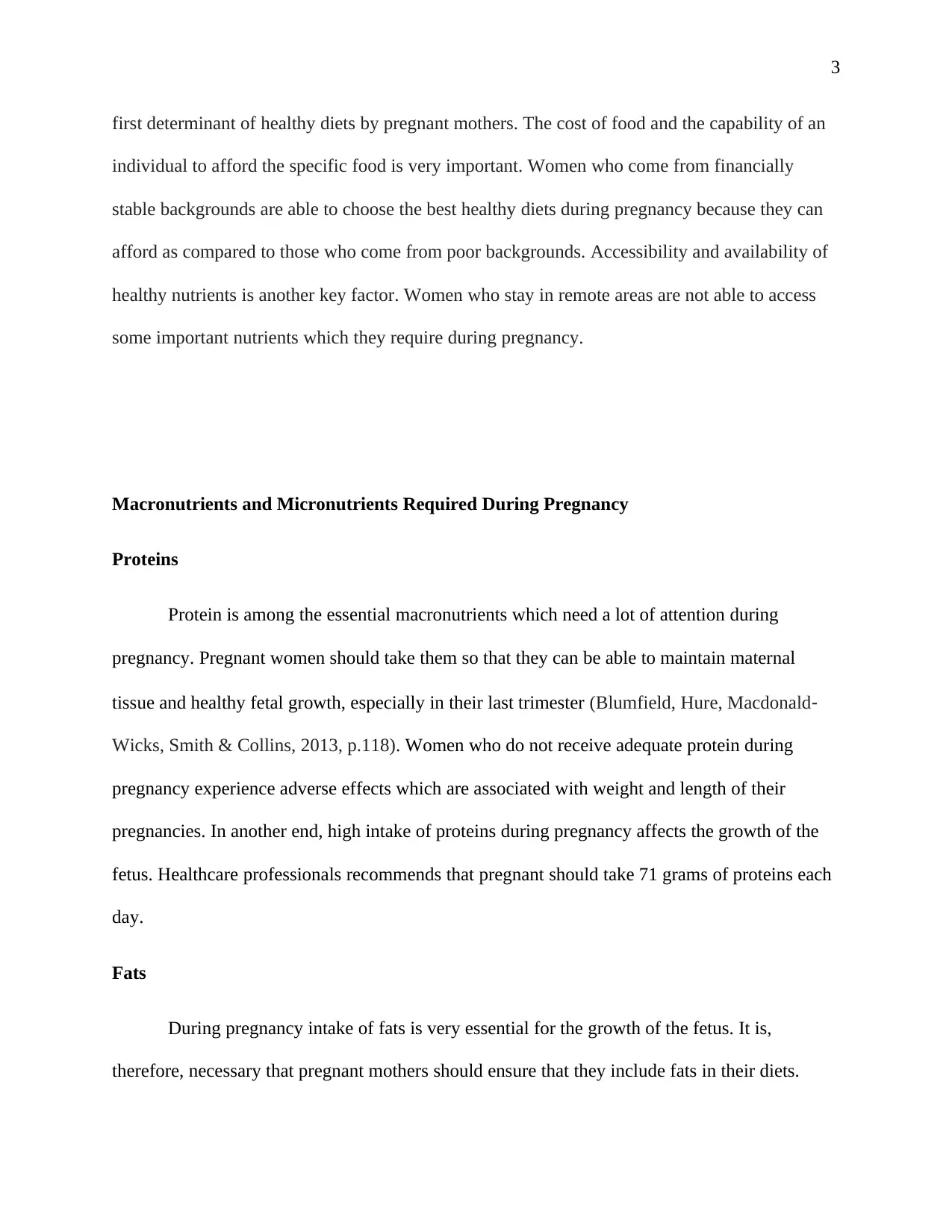
3
first determinant of healthy diets by pregnant mothers. The cost of food and the capability of an
individual to afford the specific food is very important. Women who come from financially
stable backgrounds are able to choose the best healthy diets during pregnancy because they can
afford as compared to those who come from poor backgrounds. Accessibility and availability of
healthy nutrients is another key factor. Women who stay in remote areas are not able to access
some important nutrients which they require during pregnancy.
Macronutrients and Micronutrients Required During Pregnancy
Proteins
Protein is among the essential macronutrients which need a lot of attention during
pregnancy. Pregnant women should take them so that they can be able to maintain maternal
tissue and healthy fetal growth, especially in their last trimester (Blumfield, Hure, Macdonald‐
Wicks, Smith & Collins, 2013, p.118). Women who do not receive adequate protein during
pregnancy experience adverse effects which are associated with weight and length of their
pregnancies. In another end, high intake of proteins during pregnancy affects the growth of the
fetus. Healthcare professionals recommends that pregnant should take 71 grams of proteins each
day.
Fats
During pregnancy intake of fats is very essential for the growth of the fetus. It is,
therefore, necessary that pregnant mothers should ensure that they include fats in their diets.
first determinant of healthy diets by pregnant mothers. The cost of food and the capability of an
individual to afford the specific food is very important. Women who come from financially
stable backgrounds are able to choose the best healthy diets during pregnancy because they can
afford as compared to those who come from poor backgrounds. Accessibility and availability of
healthy nutrients is another key factor. Women who stay in remote areas are not able to access
some important nutrients which they require during pregnancy.
Macronutrients and Micronutrients Required During Pregnancy
Proteins
Protein is among the essential macronutrients which need a lot of attention during
pregnancy. Pregnant women should take them so that they can be able to maintain maternal
tissue and healthy fetal growth, especially in their last trimester (Blumfield, Hure, Macdonald‐
Wicks, Smith & Collins, 2013, p.118). Women who do not receive adequate protein during
pregnancy experience adverse effects which are associated with weight and length of their
pregnancies. In another end, high intake of proteins during pregnancy affects the growth of the
fetus. Healthcare professionals recommends that pregnant should take 71 grams of proteins each
day.
Fats
During pregnancy intake of fats is very essential for the growth of the fetus. It is,
therefore, necessary that pregnant mothers should ensure that they include fats in their diets.
⊘ This is a preview!⊘
Do you want full access?
Subscribe today to unlock all pages.

Trusted by 1+ million students worldwide
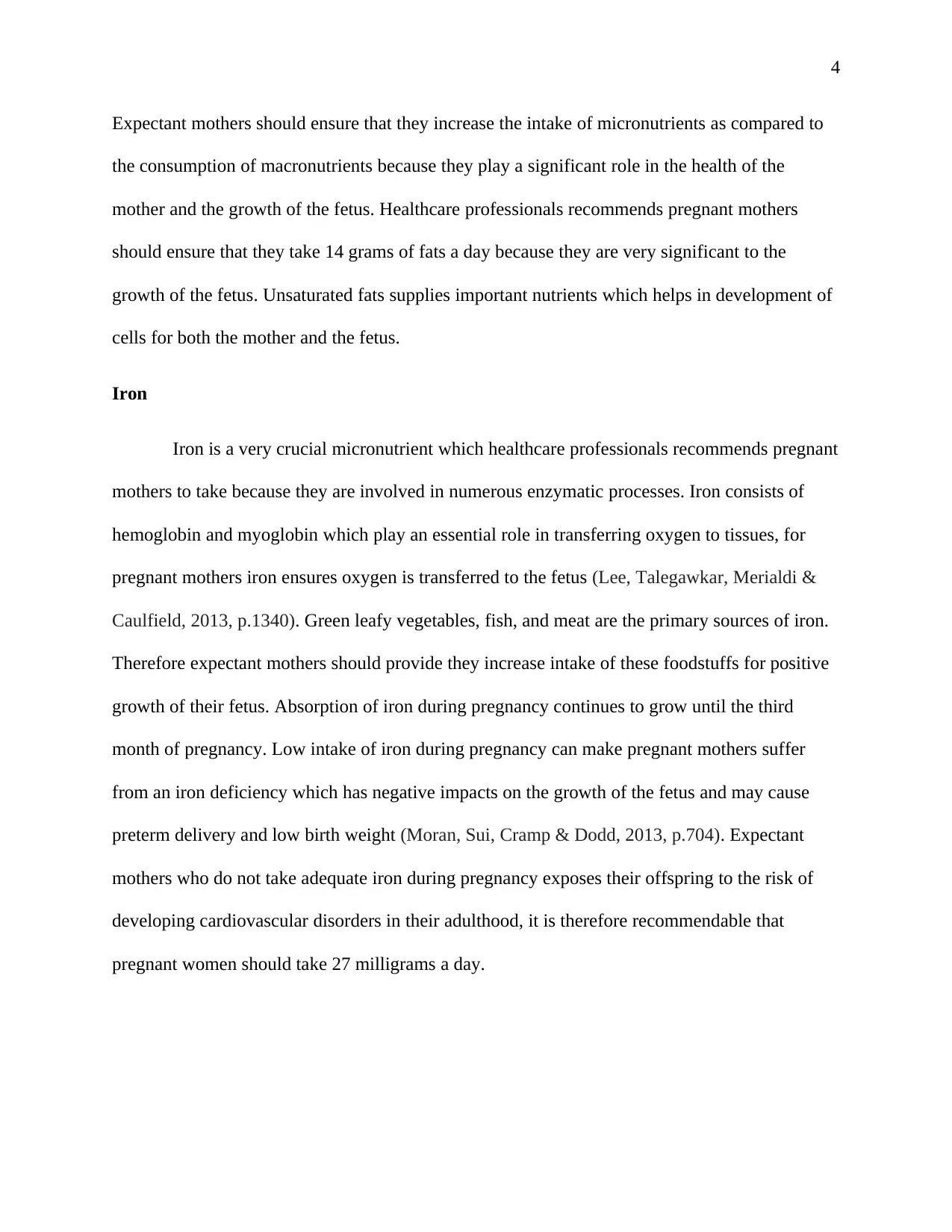
4
Expectant mothers should ensure that they increase the intake of micronutrients as compared to
the consumption of macronutrients because they play a significant role in the health of the
mother and the growth of the fetus. Healthcare professionals recommends pregnant mothers
should ensure that they take 14 grams of fats a day because they are very significant to the
growth of the fetus. Unsaturated fats supplies important nutrients which helps in development of
cells for both the mother and the fetus.
Iron
Iron is a very crucial micronutrient which healthcare professionals recommends pregnant
mothers to take because they are involved in numerous enzymatic processes. Iron consists of
hemoglobin and myoglobin which play an essential role in transferring oxygen to tissues, for
pregnant mothers iron ensures oxygen is transferred to the fetus (Lee, Talegawkar, Merialdi &
Caulfield, 2013, p.1340). Green leafy vegetables, fish, and meat are the primary sources of iron.
Therefore expectant mothers should provide they increase intake of these foodstuffs for positive
growth of their fetus. Absorption of iron during pregnancy continues to grow until the third
month of pregnancy. Low intake of iron during pregnancy can make pregnant mothers suffer
from an iron deficiency which has negative impacts on the growth of the fetus and may cause
preterm delivery and low birth weight (Moran, Sui, Cramp & Dodd, 2013, p.704). Expectant
mothers who do not take adequate iron during pregnancy exposes their offspring to the risk of
developing cardiovascular disorders in their adulthood, it is therefore recommendable that
pregnant women should take 27 milligrams a day.
Expectant mothers should ensure that they increase the intake of micronutrients as compared to
the consumption of macronutrients because they play a significant role in the health of the
mother and the growth of the fetus. Healthcare professionals recommends pregnant mothers
should ensure that they take 14 grams of fats a day because they are very significant to the
growth of the fetus. Unsaturated fats supplies important nutrients which helps in development of
cells for both the mother and the fetus.
Iron
Iron is a very crucial micronutrient which healthcare professionals recommends pregnant
mothers to take because they are involved in numerous enzymatic processes. Iron consists of
hemoglobin and myoglobin which play an essential role in transferring oxygen to tissues, for
pregnant mothers iron ensures oxygen is transferred to the fetus (Lee, Talegawkar, Merialdi &
Caulfield, 2013, p.1340). Green leafy vegetables, fish, and meat are the primary sources of iron.
Therefore expectant mothers should provide they increase intake of these foodstuffs for positive
growth of their fetus. Absorption of iron during pregnancy continues to grow until the third
month of pregnancy. Low intake of iron during pregnancy can make pregnant mothers suffer
from an iron deficiency which has negative impacts on the growth of the fetus and may cause
preterm delivery and low birth weight (Moran, Sui, Cramp & Dodd, 2013, p.704). Expectant
mothers who do not take adequate iron during pregnancy exposes their offspring to the risk of
developing cardiovascular disorders in their adulthood, it is therefore recommendable that
pregnant women should take 27 milligrams a day.
Paraphrase This Document
Need a fresh take? Get an instant paraphrase of this document with our AI Paraphraser
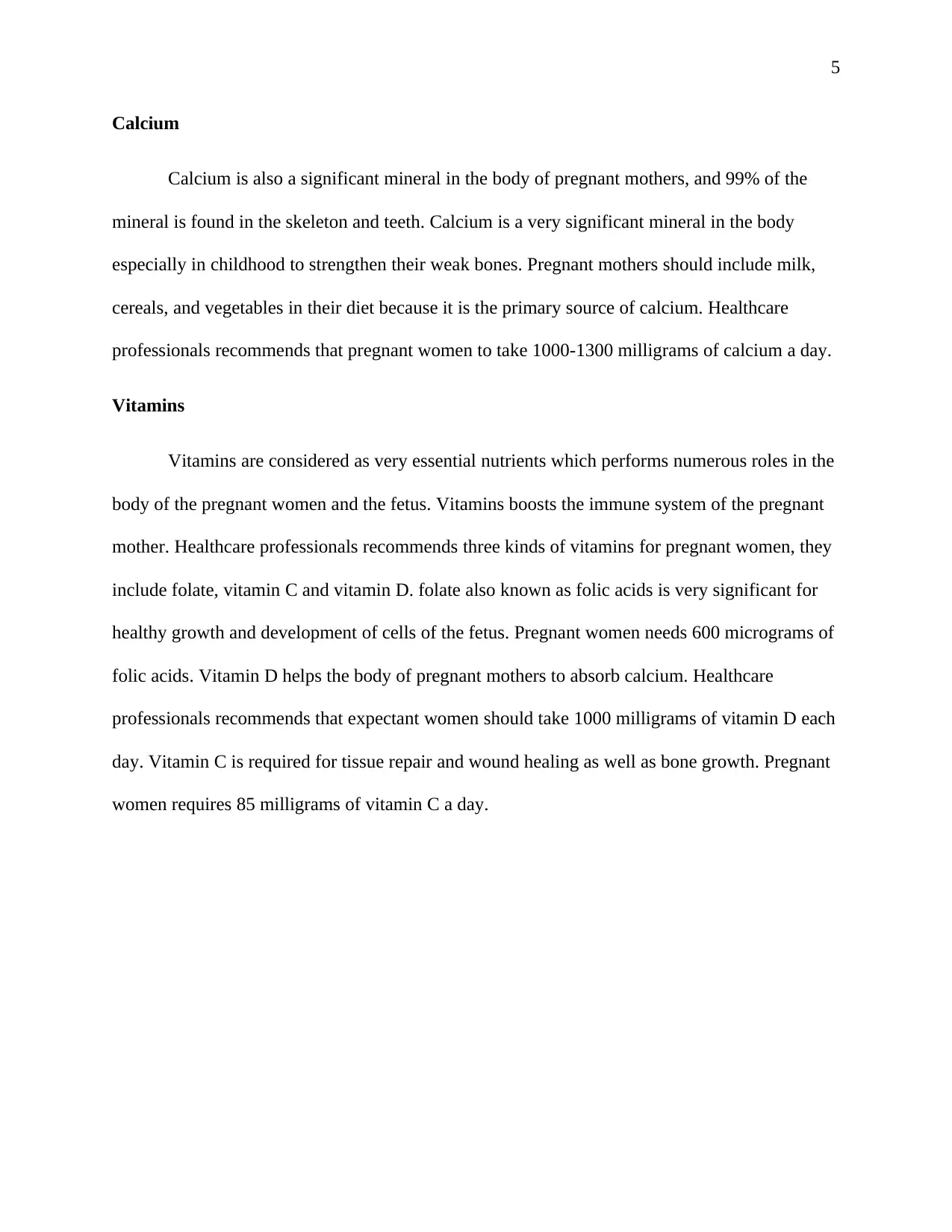
5
Calcium
Calcium is also a significant mineral in the body of pregnant mothers, and 99% of the
mineral is found in the skeleton and teeth. Calcium is a very significant mineral in the body
especially in childhood to strengthen their weak bones. Pregnant mothers should include milk,
cereals, and vegetables in their diet because it is the primary source of calcium. Healthcare
professionals recommends that pregnant women to take 1000-1300 milligrams of calcium a day.
Vitamins
Vitamins are considered as very essential nutrients which performs numerous roles in the
body of the pregnant women and the fetus. Vitamins boosts the immune system of the pregnant
mother. Healthcare professionals recommends three kinds of vitamins for pregnant women, they
include folate, vitamin C and vitamin D. folate also known as folic acids is very significant for
healthy growth and development of cells of the fetus. Pregnant women needs 600 micrograms of
folic acids. Vitamin D helps the body of pregnant mothers to absorb calcium. Healthcare
professionals recommends that expectant women should take 1000 milligrams of vitamin D each
day. Vitamin C is required for tissue repair and wound healing as well as bone growth. Pregnant
women requires 85 milligrams of vitamin C a day.
Calcium
Calcium is also a significant mineral in the body of pregnant mothers, and 99% of the
mineral is found in the skeleton and teeth. Calcium is a very significant mineral in the body
especially in childhood to strengthen their weak bones. Pregnant mothers should include milk,
cereals, and vegetables in their diet because it is the primary source of calcium. Healthcare
professionals recommends that pregnant women to take 1000-1300 milligrams of calcium a day.
Vitamins
Vitamins are considered as very essential nutrients which performs numerous roles in the
body of the pregnant women and the fetus. Vitamins boosts the immune system of the pregnant
mother. Healthcare professionals recommends three kinds of vitamins for pregnant women, they
include folate, vitamin C and vitamin D. folate also known as folic acids is very significant for
healthy growth and development of cells of the fetus. Pregnant women needs 600 micrograms of
folic acids. Vitamin D helps the body of pregnant mothers to absorb calcium. Healthcare
professionals recommends that expectant women should take 1000 milligrams of vitamin D each
day. Vitamin C is required for tissue repair and wound healing as well as bone growth. Pregnant
women requires 85 milligrams of vitamin C a day.
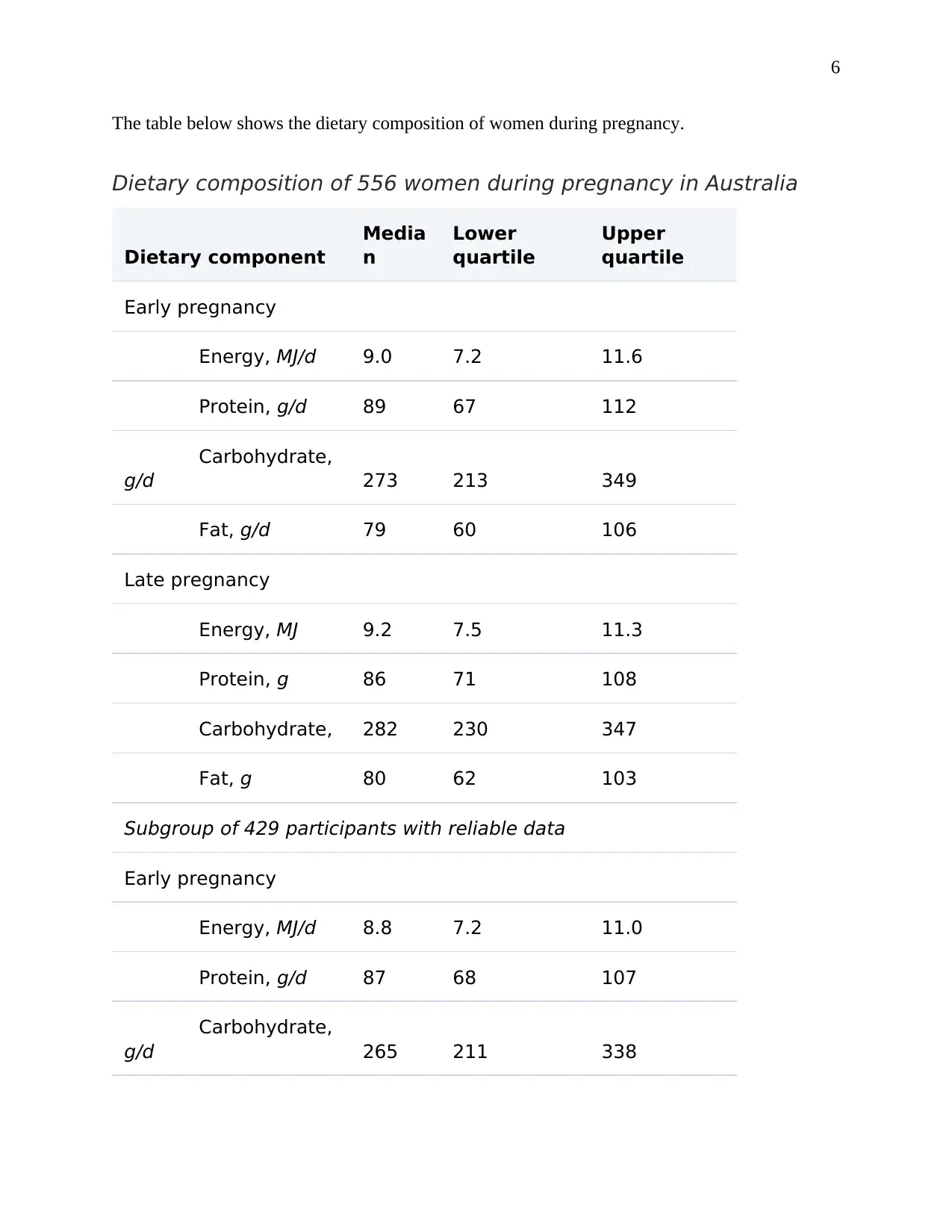
6
The table below shows the dietary composition of women during pregnancy.
Dietary composition of 556 women during pregnancy in Australia
Dietary component
Media
n
Lower
quartile
Upper
quartile
Early pregnancy
Energy, MJ/d 9.0 7.2 11.6
Protein, g/d 89 67 112
Carbohydrate,
g/d 273 213 349
Fat, g/d 79 60 106
Late pregnancy
Energy, MJ 9.2 7.5 11.3
Protein, g 86 71 108
Carbohydrate, 282 230 347
Fat, g 80 62 103
Subgroup of 429 participants with reliable data
Early pregnancy
Energy, MJ/d 8.8 7.2 11.0
Protein, g/d 87 68 107
Carbohydrate,
g/d 265 211 338
The table below shows the dietary composition of women during pregnancy.
Dietary composition of 556 women during pregnancy in Australia
Dietary component
Media
n
Lower
quartile
Upper
quartile
Early pregnancy
Energy, MJ/d 9.0 7.2 11.6
Protein, g/d 89 67 112
Carbohydrate,
g/d 273 213 349
Fat, g/d 79 60 106
Late pregnancy
Energy, MJ 9.2 7.5 11.3
Protein, g 86 71 108
Carbohydrate, 282 230 347
Fat, g 80 62 103
Subgroup of 429 participants with reliable data
Early pregnancy
Energy, MJ/d 8.8 7.2 11.0
Protein, g/d 87 68 107
Carbohydrate,
g/d 265 211 338
⊘ This is a preview!⊘
Do you want full access?
Subscribe today to unlock all pages.

Trusted by 1+ million students worldwide
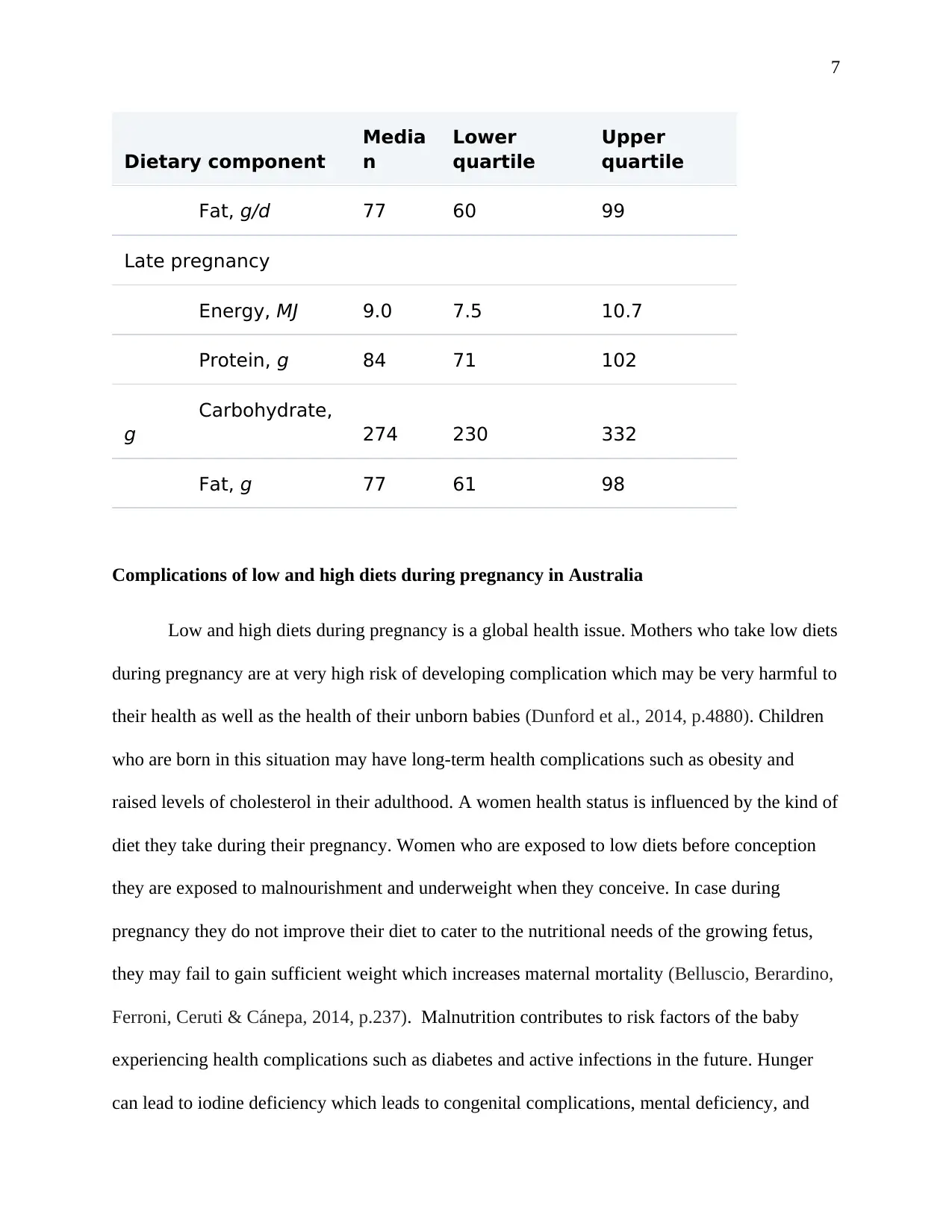
7
Dietary component
Media
n
Lower
quartile
Upper
quartile
Fat, g/d 77 60 99
Late pregnancy
Energy, MJ 9.0 7.5 10.7
Protein, g 84 71 102
Carbohydrate,
g 274 230 332
Fat, g 77 61 98
Complications of low and high diets during pregnancy in Australia
Low and high diets during pregnancy is a global health issue. Mothers who take low diets
during pregnancy are at very high risk of developing complication which may be very harmful to
their health as well as the health of their unborn babies (Dunford et al., 2014, p.4880). Children
who are born in this situation may have long-term health complications such as obesity and
raised levels of cholesterol in their adulthood. A women health status is influenced by the kind of
diet they take during their pregnancy. Women who are exposed to low diets before conception
they are exposed to malnourishment and underweight when they conceive. In case during
pregnancy they do not improve their diet to cater to the nutritional needs of the growing fetus,
they may fail to gain sufficient weight which increases maternal mortality (Belluscio, Berardino,
Ferroni, Ceruti & Cánepa, 2014, p.237). Malnutrition contributes to risk factors of the baby
experiencing health complications such as diabetes and active infections in the future. Hunger
can lead to iodine deficiency which leads to congenital complications, mental deficiency, and
Dietary component
Media
n
Lower
quartile
Upper
quartile
Fat, g/d 77 60 99
Late pregnancy
Energy, MJ 9.0 7.5 10.7
Protein, g 84 71 102
Carbohydrate,
g 274 230 332
Fat, g 77 61 98
Complications of low and high diets during pregnancy in Australia
Low and high diets during pregnancy is a global health issue. Mothers who take low diets
during pregnancy are at very high risk of developing complication which may be very harmful to
their health as well as the health of their unborn babies (Dunford et al., 2014, p.4880). Children
who are born in this situation may have long-term health complications such as obesity and
raised levels of cholesterol in their adulthood. A women health status is influenced by the kind of
diet they take during their pregnancy. Women who are exposed to low diets before conception
they are exposed to malnourishment and underweight when they conceive. In case during
pregnancy they do not improve their diet to cater to the nutritional needs of the growing fetus,
they may fail to gain sufficient weight which increases maternal mortality (Belluscio, Berardino,
Ferroni, Ceruti & Cánepa, 2014, p.237). Malnutrition contributes to risk factors of the baby
experiencing health complications such as diabetes and active infections in the future. Hunger
can lead to iodine deficiency which leads to congenital complications, mental deficiency, and
Paraphrase This Document
Need a fresh take? Get an instant paraphrase of this document with our AI Paraphraser
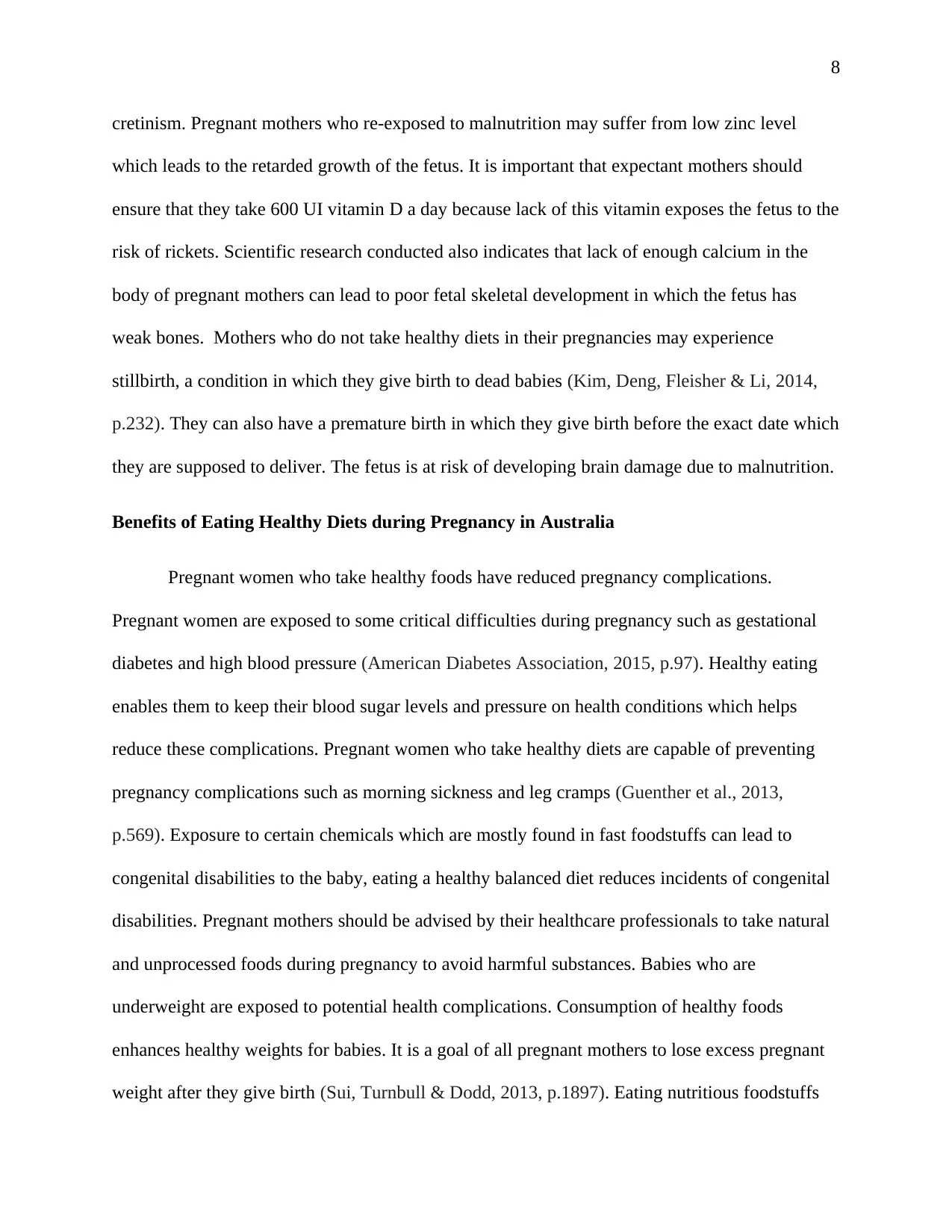
8
cretinism. Pregnant mothers who re-exposed to malnutrition may suffer from low zinc level
which leads to the retarded growth of the fetus. It is important that expectant mothers should
ensure that they take 600 UI vitamin D a day because lack of this vitamin exposes the fetus to the
risk of rickets. Scientific research conducted also indicates that lack of enough calcium in the
body of pregnant mothers can lead to poor fetal skeletal development in which the fetus has
weak bones. Mothers who do not take healthy diets in their pregnancies may experience
stillbirth, a condition in which they give birth to dead babies (Kim, Deng, Fleisher & Li, 2014,
p.232). They can also have a premature birth in which they give birth before the exact date which
they are supposed to deliver. The fetus is at risk of developing brain damage due to malnutrition.
Benefits of Eating Healthy Diets during Pregnancy in Australia
Pregnant women who take healthy foods have reduced pregnancy complications.
Pregnant women are exposed to some critical difficulties during pregnancy such as gestational
diabetes and high blood pressure (American Diabetes Association, 2015, p.97). Healthy eating
enables them to keep their blood sugar levels and pressure on health conditions which helps
reduce these complications. Pregnant women who take healthy diets are capable of preventing
pregnancy complications such as morning sickness and leg cramps (Guenther et al., 2013,
p.569). Exposure to certain chemicals which are mostly found in fast foodstuffs can lead to
congenital disabilities to the baby, eating a healthy balanced diet reduces incidents of congenital
disabilities. Pregnant mothers should be advised by their healthcare professionals to take natural
and unprocessed foods during pregnancy to avoid harmful substances. Babies who are
underweight are exposed to potential health complications. Consumption of healthy foods
enhances healthy weights for babies. It is a goal of all pregnant mothers to lose excess pregnant
weight after they give birth (Sui, Turnbull & Dodd, 2013, p.1897). Eating nutritious foodstuffs
cretinism. Pregnant mothers who re-exposed to malnutrition may suffer from low zinc level
which leads to the retarded growth of the fetus. It is important that expectant mothers should
ensure that they take 600 UI vitamin D a day because lack of this vitamin exposes the fetus to the
risk of rickets. Scientific research conducted also indicates that lack of enough calcium in the
body of pregnant mothers can lead to poor fetal skeletal development in which the fetus has
weak bones. Mothers who do not take healthy diets in their pregnancies may experience
stillbirth, a condition in which they give birth to dead babies (Kim, Deng, Fleisher & Li, 2014,
p.232). They can also have a premature birth in which they give birth before the exact date which
they are supposed to deliver. The fetus is at risk of developing brain damage due to malnutrition.
Benefits of Eating Healthy Diets during Pregnancy in Australia
Pregnant women who take healthy foods have reduced pregnancy complications.
Pregnant women are exposed to some critical difficulties during pregnancy such as gestational
diabetes and high blood pressure (American Diabetes Association, 2015, p.97). Healthy eating
enables them to keep their blood sugar levels and pressure on health conditions which helps
reduce these complications. Pregnant women who take healthy diets are capable of preventing
pregnancy complications such as morning sickness and leg cramps (Guenther et al., 2013,
p.569). Exposure to certain chemicals which are mostly found in fast foodstuffs can lead to
congenital disabilities to the baby, eating a healthy balanced diet reduces incidents of congenital
disabilities. Pregnant mothers should be advised by their healthcare professionals to take natural
and unprocessed foods during pregnancy to avoid harmful substances. Babies who are
underweight are exposed to potential health complications. Consumption of healthy foods
enhances healthy weights for babies. It is a goal of all pregnant mothers to lose excess pregnant
weight after they give birth (Sui, Turnbull & Dodd, 2013, p.1897). Eating nutritious foodstuffs
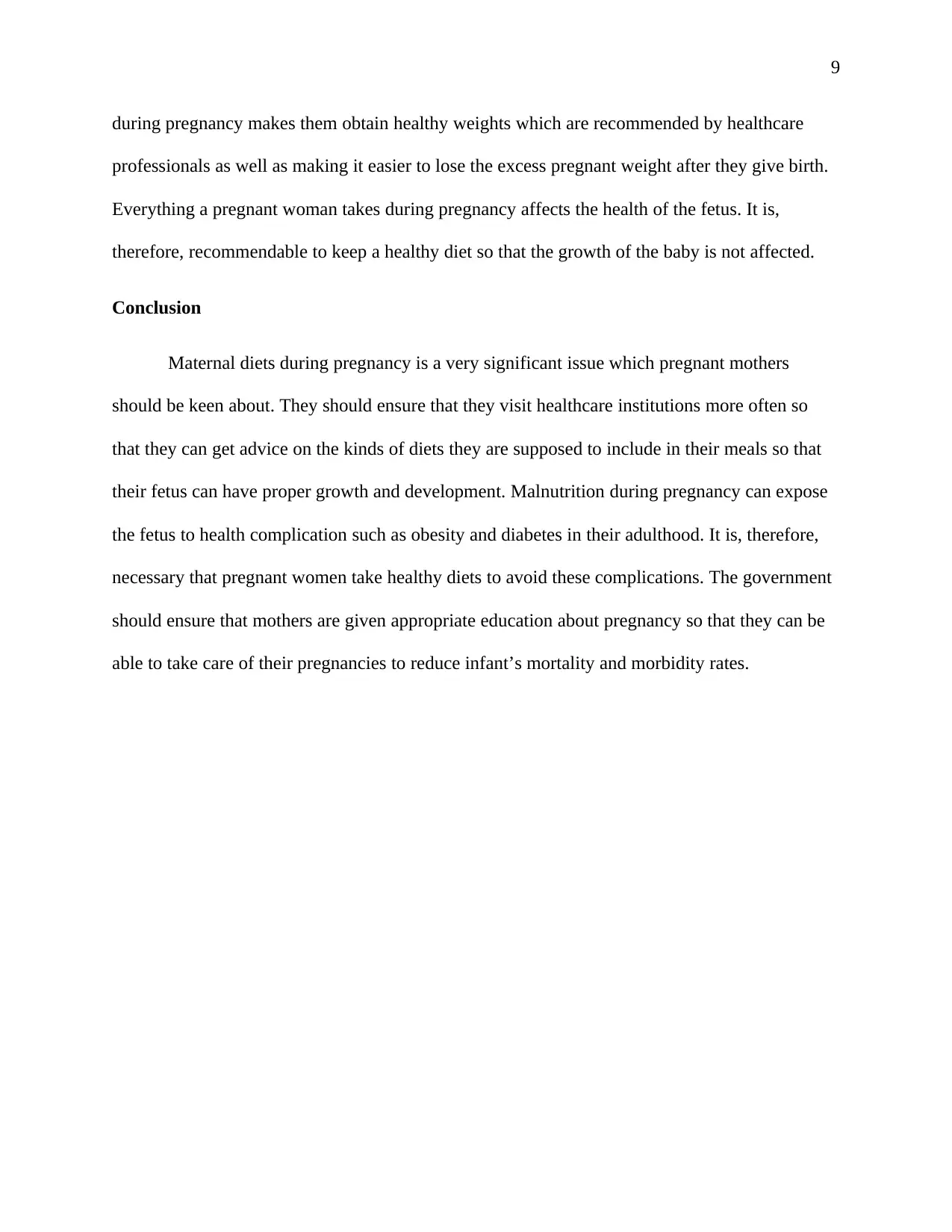
9
during pregnancy makes them obtain healthy weights which are recommended by healthcare
professionals as well as making it easier to lose the excess pregnant weight after they give birth.
Everything a pregnant woman takes during pregnancy affects the health of the fetus. It is,
therefore, recommendable to keep a healthy diet so that the growth of the baby is not affected.
Conclusion
Maternal diets during pregnancy is a very significant issue which pregnant mothers
should be keen about. They should ensure that they visit healthcare institutions more often so
that they can get advice on the kinds of diets they are supposed to include in their meals so that
their fetus can have proper growth and development. Malnutrition during pregnancy can expose
the fetus to health complication such as obesity and diabetes in their adulthood. It is, therefore,
necessary that pregnant women take healthy diets to avoid these complications. The government
should ensure that mothers are given appropriate education about pregnancy so that they can be
able to take care of their pregnancies to reduce infant’s mortality and morbidity rates.
during pregnancy makes them obtain healthy weights which are recommended by healthcare
professionals as well as making it easier to lose the excess pregnant weight after they give birth.
Everything a pregnant woman takes during pregnancy affects the health of the fetus. It is,
therefore, recommendable to keep a healthy diet so that the growth of the baby is not affected.
Conclusion
Maternal diets during pregnancy is a very significant issue which pregnant mothers
should be keen about. They should ensure that they visit healthcare institutions more often so
that they can get advice on the kinds of diets they are supposed to include in their meals so that
their fetus can have proper growth and development. Malnutrition during pregnancy can expose
the fetus to health complication such as obesity and diabetes in their adulthood. It is, therefore,
necessary that pregnant women take healthy diets to avoid these complications. The government
should ensure that mothers are given appropriate education about pregnancy so that they can be
able to take care of their pregnancies to reduce infant’s mortality and morbidity rates.
⊘ This is a preview!⊘
Do you want full access?
Subscribe today to unlock all pages.

Trusted by 1+ million students worldwide
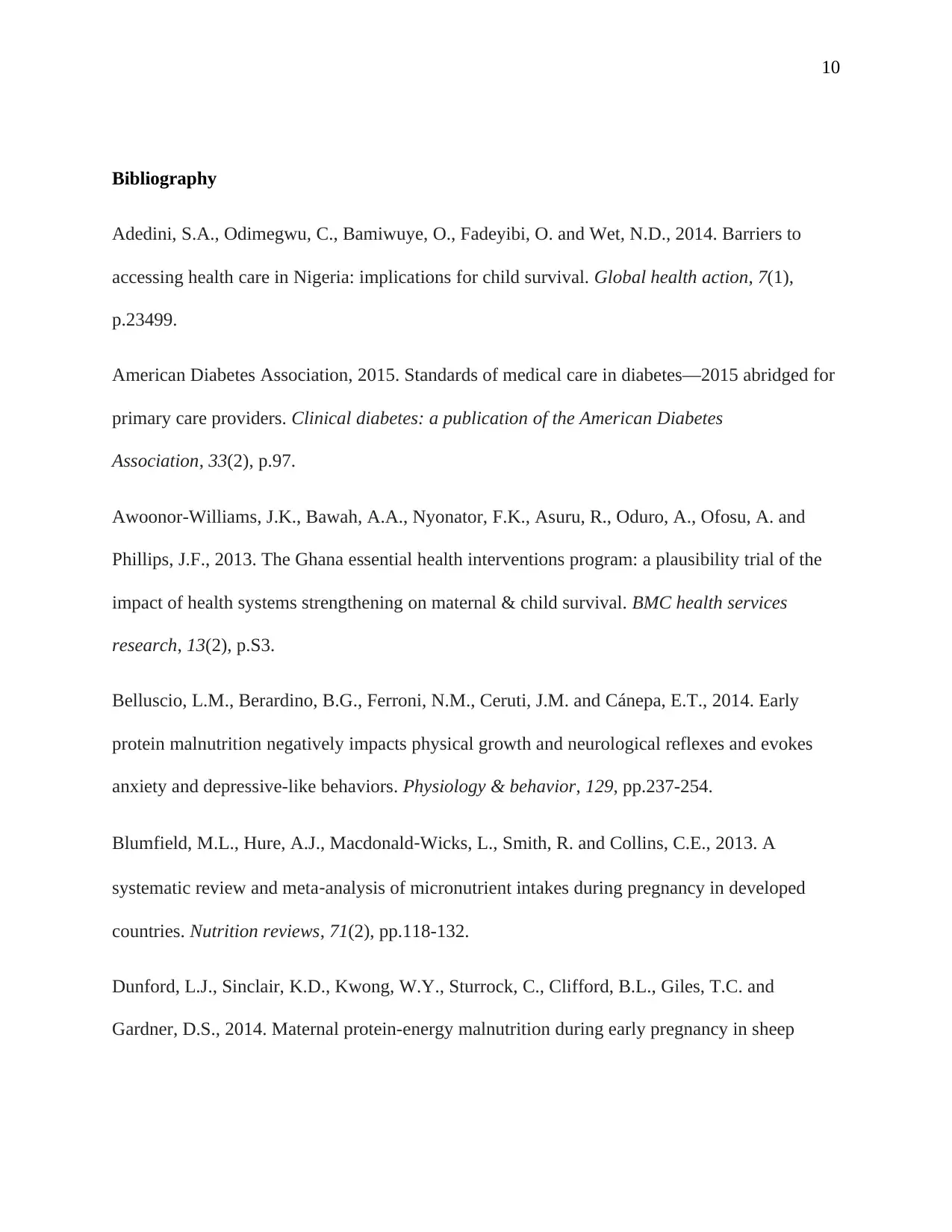
10
Bibliography
Adedini, S.A., Odimegwu, C., Bamiwuye, O., Fadeyibi, O. and Wet, N.D., 2014. Barriers to
accessing health care in Nigeria: implications for child survival. Global health action, 7(1),
p.23499.
American Diabetes Association, 2015. Standards of medical care in diabetes—2015 abridged for
primary care providers. Clinical diabetes: a publication of the American Diabetes
Association, 33(2), p.97.
Awoonor-Williams, J.K., Bawah, A.A., Nyonator, F.K., Asuru, R., Oduro, A., Ofosu, A. and
Phillips, J.F., 2013. The Ghana essential health interventions program: a plausibility trial of the
impact of health systems strengthening on maternal & child survival. BMC health services
research, 13(2), p.S3.
Belluscio, L.M., Berardino, B.G., Ferroni, N.M., Ceruti, J.M. and Cánepa, E.T., 2014. Early
protein malnutrition negatively impacts physical growth and neurological reflexes and evokes
anxiety and depressive-like behaviors. Physiology & behavior, 129, pp.237-254.
Blumfield, M.L., Hure, A.J., Macdonald‐Wicks, L., Smith, R. and Collins, C.E., 2013. A
systematic review and meta‐analysis of micronutrient intakes during pregnancy in developed
countries. Nutrition reviews, 71(2), pp.118-132.
Dunford, L.J., Sinclair, K.D., Kwong, W.Y., Sturrock, C., Clifford, B.L., Giles, T.C. and
Gardner, D.S., 2014. Maternal protein-energy malnutrition during early pregnancy in sheep
Bibliography
Adedini, S.A., Odimegwu, C., Bamiwuye, O., Fadeyibi, O. and Wet, N.D., 2014. Barriers to
accessing health care in Nigeria: implications for child survival. Global health action, 7(1),
p.23499.
American Diabetes Association, 2015. Standards of medical care in diabetes—2015 abridged for
primary care providers. Clinical diabetes: a publication of the American Diabetes
Association, 33(2), p.97.
Awoonor-Williams, J.K., Bawah, A.A., Nyonator, F.K., Asuru, R., Oduro, A., Ofosu, A. and
Phillips, J.F., 2013. The Ghana essential health interventions program: a plausibility trial of the
impact of health systems strengthening on maternal & child survival. BMC health services
research, 13(2), p.S3.
Belluscio, L.M., Berardino, B.G., Ferroni, N.M., Ceruti, J.M. and Cánepa, E.T., 2014. Early
protein malnutrition negatively impacts physical growth and neurological reflexes and evokes
anxiety and depressive-like behaviors. Physiology & behavior, 129, pp.237-254.
Blumfield, M.L., Hure, A.J., Macdonald‐Wicks, L., Smith, R. and Collins, C.E., 2013. A
systematic review and meta‐analysis of micronutrient intakes during pregnancy in developed
countries. Nutrition reviews, 71(2), pp.118-132.
Dunford, L.J., Sinclair, K.D., Kwong, W.Y., Sturrock, C., Clifford, B.L., Giles, T.C. and
Gardner, D.S., 2014. Maternal protein-energy malnutrition during early pregnancy in sheep
Paraphrase This Document
Need a fresh take? Get an instant paraphrase of this document with our AI Paraphraser
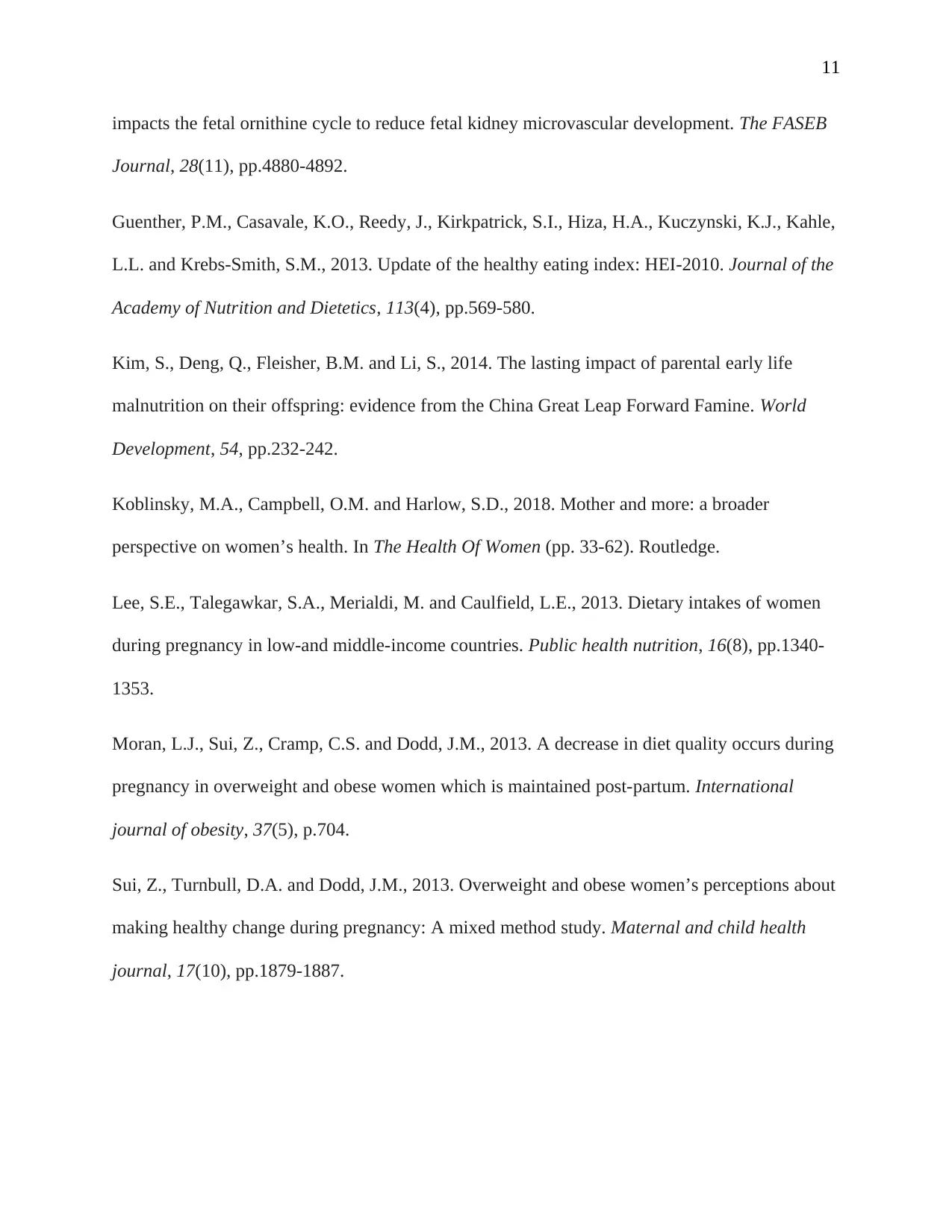
11
impacts the fetal ornithine cycle to reduce fetal kidney microvascular development. The FASEB
Journal, 28(11), pp.4880-4892.
Guenther, P.M., Casavale, K.O., Reedy, J., Kirkpatrick, S.I., Hiza, H.A., Kuczynski, K.J., Kahle,
L.L. and Krebs-Smith, S.M., 2013. Update of the healthy eating index: HEI-2010. Journal of the
Academy of Nutrition and Dietetics, 113(4), pp.569-580.
Kim, S., Deng, Q., Fleisher, B.M. and Li, S., 2014. The lasting impact of parental early life
malnutrition on their offspring: evidence from the China Great Leap Forward Famine. World
Development, 54, pp.232-242.
Koblinsky, M.A., Campbell, O.M. and Harlow, S.D., 2018. Mother and more: a broader
perspective on women’s health. In The Health Of Women (pp. 33-62). Routledge.
Lee, S.E., Talegawkar, S.A., Merialdi, M. and Caulfield, L.E., 2013. Dietary intakes of women
during pregnancy in low-and middle-income countries. Public health nutrition, 16(8), pp.1340-
1353.
Moran, L.J., Sui, Z., Cramp, C.S. and Dodd, J.M., 2013. A decrease in diet quality occurs during
pregnancy in overweight and obese women which is maintained post-partum. International
journal of obesity, 37(5), p.704.
Sui, Z., Turnbull, D.A. and Dodd, J.M., 2013. Overweight and obese women’s perceptions about
making healthy change during pregnancy: A mixed method study. Maternal and child health
journal, 17(10), pp.1879-1887.
impacts the fetal ornithine cycle to reduce fetal kidney microvascular development. The FASEB
Journal, 28(11), pp.4880-4892.
Guenther, P.M., Casavale, K.O., Reedy, J., Kirkpatrick, S.I., Hiza, H.A., Kuczynski, K.J., Kahle,
L.L. and Krebs-Smith, S.M., 2013. Update of the healthy eating index: HEI-2010. Journal of the
Academy of Nutrition and Dietetics, 113(4), pp.569-580.
Kim, S., Deng, Q., Fleisher, B.M. and Li, S., 2014. The lasting impact of parental early life
malnutrition on their offspring: evidence from the China Great Leap Forward Famine. World
Development, 54, pp.232-242.
Koblinsky, M.A., Campbell, O.M. and Harlow, S.D., 2018. Mother and more: a broader
perspective on women’s health. In The Health Of Women (pp. 33-62). Routledge.
Lee, S.E., Talegawkar, S.A., Merialdi, M. and Caulfield, L.E., 2013. Dietary intakes of women
during pregnancy in low-and middle-income countries. Public health nutrition, 16(8), pp.1340-
1353.
Moran, L.J., Sui, Z., Cramp, C.S. and Dodd, J.M., 2013. A decrease in diet quality occurs during
pregnancy in overweight and obese women which is maintained post-partum. International
journal of obesity, 37(5), p.704.
Sui, Z., Turnbull, D.A. and Dodd, J.M., 2013. Overweight and obese women’s perceptions about
making healthy change during pregnancy: A mixed method study. Maternal and child health
journal, 17(10), pp.1879-1887.
1 out of 11
Related Documents
Your All-in-One AI-Powered Toolkit for Academic Success.
+13062052269
info@desklib.com
Available 24*7 on WhatsApp / Email
![[object Object]](/_next/static/media/star-bottom.7253800d.svg)
Unlock your academic potential
Copyright © 2020–2026 A2Z Services. All Rights Reserved. Developed and managed by ZUCOL.





